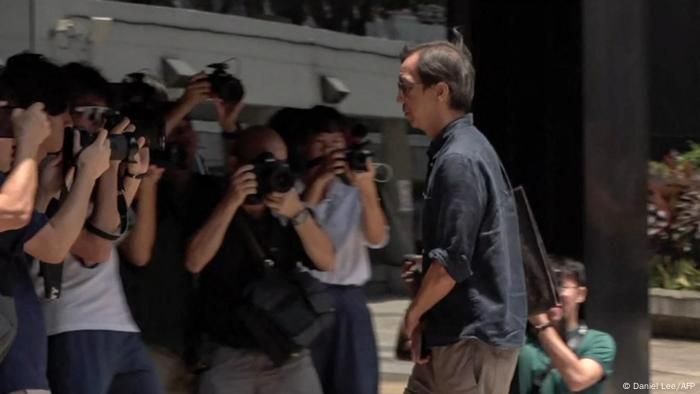香港大學教授李衍樺自殺身亡,其遺書在網絡上流傳,引發輿論關注。遺書中表達了對香港現狀的絕望和對未來的不抱希望,引發許多人共鳴。儘管遺書真偽難辨,但事件反映了香港社會的巨大轉變。香港媒體對事件的報導顯得小心翼翼,不敢提及遺書內容,而警方則出面闢謠,反而更像是坐實了遺書的真實性。無論遺書真偽與否,它都折射出香港人普遍的灰暗情緒,與官方宣傳的「由治及興」形成鮮明對比。
Original Title: 客座評論:那一年起,香港人有真正快樂過嗎?
Summary: This week, news of a university professor’s suicide has sparked concern among Hong Kong people and Chinese communities both at home and abroad. After the incident, both the police and City University confirmed the identity of the deceased, and Hong Kong media generally reported that “preliminary investigations show that the 59-year-old deceased had sought professional help for mental health issues, and recently revealed that he was worried or troubled by his physical health and work.”
Overseas media mentioned that Professor Li Yanhua left a “last words,” originating from “people spreading a post on social media that Li made in his Moments,” but there was no specific time of posting; the circulating screenshot cannot be identified as Li’s account.
The content of the circulated letter is very tragic, with key excerpts as follows: “The day I left the Big Four, Hong Kong’s Basic Law Article 23 ‘legislation is settled, the sky is gray,’ from the spring of 2019, ‘I haven’t been truly happy for a single day.’ As a lost generation, I no longer have any expectations for the future of Hong Kong.”
“After I’m gone, please scatter my ashes into the sea, ‘Forgive me for my unrestrained love for freedom,’ if you miss me, come here and have a look.”
“I think the feeling of being crushed by a train should be similar to being crushed by a tank… maybe it’s romantic to end my life in this city I love so much, the same age as me but declining, in such a tragic way.”
Since the “last words” clearly stated “2019,” “Article 23,” “tanks crushed,” “lost generation,” it is equivalent to a knowledgeable person using their life to make a life-and-death accusation against the destruction of Hong Kong by tyranny, immediately triggering public attention.
At this time, you look at the Hong Kong media, no one mentions this letter, which feels very unusual, but under the national security environment, it feels normal, who would dare to mention this accusing letter?
Unexpectedly, after days of silence, the police couldn’t help but respond, accusing people online of spreading false images of Professor Li’s suicide, making irresponsible remarks without any factual basis, expressing strong condemnation, and urging citizens to be careful in discerning the authenticity of online information.
This seems to confirm that the letter may be real. Because in the Chinese mainland’s media ecology, “rumors” are sometimes “predictions that are far ahead of their time,” and when the authorities “debunk,” it is often with authority confirming the truth of the rumor, which is why the authorities need to deny it.
Today, the Hong Kong police are highly publicizing their “debunking,” does this indirectly confirm the authenticity of the letter?
It is difficult for the outside world to judge, because there are too many unknown truths about the “last words,” such as the lack of identification of the author’s name or identity, the “Big Four” mentioned in the text, what does it refer to? Are they some specific terms in civil engineering? The “same age” as Hong Kong is also difficult to match with Li’s age of 59, all of which make it impossible to be 100% sure about the authenticity of the letter.
However, this incident also shows the huge changes in the ecological environment of Hong Kong. For example, since this incident has been so hyped up overseas, why are Hong Kong media not daring to cite this “news”? If it is said that this is because Hong Kong media have higher moral ethics and do not dare to quote unverified information, it should also raise media attention, at least reporters should go to Li’s family to verify.
Without a political letter, it is a tragedy; if there is a political letter, it adds a layer of political accusation, from the perspective of news reporting, it is a more public angle, why not follow up on it?
So, even if this letter is ultimately a forgery, you will see that in certain sensitive areas of Hong Kong’s media ecology, you can only wait for the “official verdict.”
Does the official have the authority to debunk? After the turmoil of 2019, the public trust in the Hong Kong police is clearly there for all to see, the result of the debunking can only be counterproductive.
Most importantly, even if this “letter” does not belong to Professor Li, just assume that it was created by someone, but the content, words, and emotional feelings seem to be more real and penetrating than the official “from governance to prosperity.”
Ask the people of Hong Kong, how many people have not been truly happy since 2019? How many people feel that Hong Kong is gray? How many people feel that they are part of the lost generation of Hong Kong?
Not everyone will take these negative thoughts to the extreme, let alone have such an extreme thought as suicide, but this letter of unknown authenticity reveals a “gray” feeling that is absolutely more real than the “governance to prosperity” and “colorful day and night” that the authorities preach.
From a news perspective, it is necessary to verify the authenticity of this letter, which is a matter of respect for the deceased, and one cannot arbitrarily place political intentions on the departed; but from the perspective of the emotional aspect of the city of Hong Kong, this letter is incredibly real, reflecting the mood of the Hong Kong people.

